Filter by
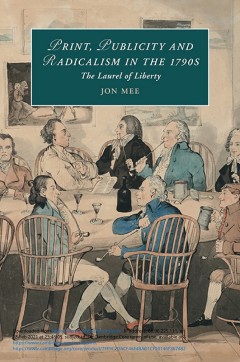
Print, publicity, and popular radicalism in the 1790s : the laurel of liberty
Jon Mee explores the popular democratic movement that emerged in the London of the 1790s in response to the French Revolution. Central to the movement's achievement was the creation of an idea of 'the people' brought into being through print and publicity. Radical clubs rose and fell in the face of the hostile attentions of government. They were sustained by a faith in the press as a form of 'p…
- Edition
- -
- ISBN/ISSN
- 9781316459935
- Collation
- xiii, 272p. : ill.
- Series Title
- -
- Call Number
- 302.232094109033 MEE p
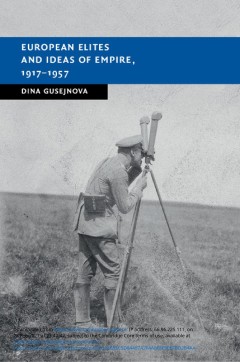
European elites and ideas of empire, 1917-1957
Who thought of Europe as a community before its economic integration in 1957? Dina Gusejnova illustrates how a supranational European mentality was forged from depleted imperial identities. In the revolutions of 1917 to 1920, the power of the Hohenzollern, Habsburg and Romanoff dynasties over their subjects expired. Even though Germany lost its credit as a world power twice in that century, in …
- Edition
- -
- ISBN/ISSN
- 9781316343050
- Collation
- xlviii, 344p. : ill.
- Series Title
- -
- Call Number
- 325.309409041 GUS e
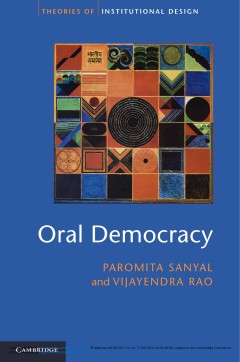
Oral democracy : deliberation in Indian village assemblies
Oral Democracy studies citizens' voices in civic and political deliberations in India's gram sabhas (village assemblies), the largest deliberative institution in human history. It analyses nearly three hundred transcripts of gram sabhas, sampled within the framework of a natural experiment, allowing the authors to study how state policy affects the quality of discourse, citizens' discursive per…
- Edition
- -
- ISBN/ISSN
- 9781139095716
- Collation
- xi, 215p. : ill.
- Series Title
- -
- Call Number
- 320.840954 SAN o
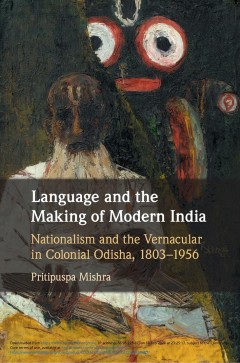
Language and the making of modern India : nationalism and the vernacular in c…
Through an examination of the creation of the first linguistically organized province in India, Odisha, Pritipuspa Mishra explores the ways regional languages came to serve as the most acceptable registers of difference in post-colonial India. She argues that rather than disrupting the rise and spread of All-India nationalism, regional linguistic nationalism enabled and deepened the reach of na…
- Edition
- -
- ISBN/ISSN
- 9781108591263
- Collation
- x, 247p. : ill.
- Series Title
- -
- Call Number
- 409.54133 MIS l
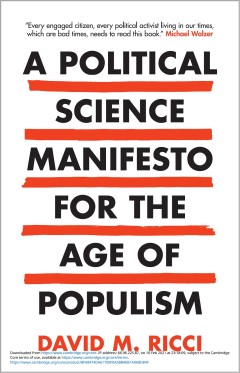
A political science manifesto for the age of populism : challenging growth, m…
Populism and authoritarian-populist parties have surged in the 21st century. In the United States, Donald Trump appears to have become the poster president for the surge. David M. Ricci, in this call to arms, thinks Trump is symptomatic of the changes that have caused a crisis among Americans - namely, mass economic and creative destruction: automation, outsourcing, deindustrialization, globali…
- Edition
- -
- ISBN/ISSN
- 9781108785440
- Collation
- x, 245p. : ill.
- Series Title
- -
- Call Number
- 320.473 RIC p
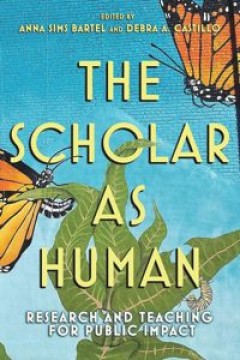
Popular music and public diplomacy : transnational and transdisciplinary pers…
In the early years of the Cold War, Western nations increasingly adopted strategies of public diplomacy involving popular music. While the diplomatic use of popular music was initially limited to such genres as jazz, the second half of the 20th century saw a growing presence of various popular genres in diplomatic contexts, including rock, punk, reggae, and hip-hop. This volume illuminates the…
- Edition
- -
- ISBN/ISSN
- 9783839443583
- Collation
- 328 p.
- Series Title
- -
- Call Number
- 306.4842 POP p
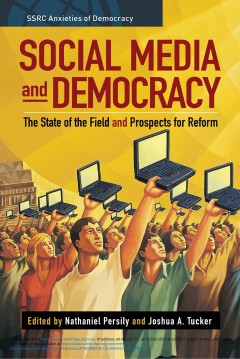
Social media and democracy : the state of the field, prospects for reform
Over the last five years, widespread concern about the effects of social media on democracy has led to an explosion in research from different disciplines and corners of academia. This book is the first of its kind to take stock of this emerging multi-disciplinary field by synthesizing what we know, identifying what we do not know and obstacles to future research, and charting a course for the …
- Edition
- -
- ISBN/ISSN
- 9781108890960
- Collation
- xvii, 345p. : ill.
- Series Title
- -
- Call Number
- 302.231 SOC s
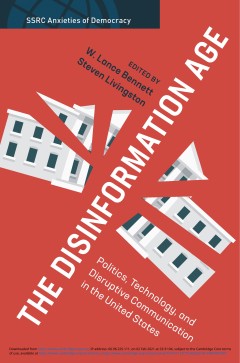
The disinformation age : politics, technology, and disruptive communication i…
The intentional spread of falsehoods – and attendant attacks on minorities, press freedoms, and the rule of law – challenge the basic norms and values upon which institutional legitimacy and political stability depend. How did we get here? The Disinformation Age assembles a remarkable group of historians, political scientists, and communication scholars to examine the historical and politic…
- Edition
- -
- ISBN/ISSN
- 9781108914628
- Collation
- xxvii, 293p. : ill.
- Series Title
- -
- Call Number
- 320.973014 DIS d
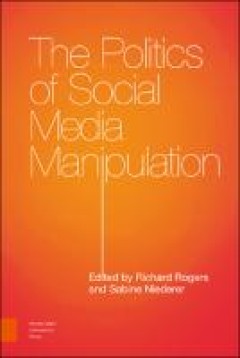
The politics of social media manipulation
Disinformation and so-called fake news are contemporary phenomena with rich histories. Disinformation, or the willful introduction of false information for the purposes of causing harm, recalls infamous foreign interference operations in national media systems. Outcries over fake news, or dubious stories with the trappings of news, have coincided with the introduction of new media technologies …
- Edition
- -
- ISBN/ISSN
- 978 90 4855 167 5 (
- Collation
- 292 p.
- Series Title
- -
- Call Number
- 320 POL p
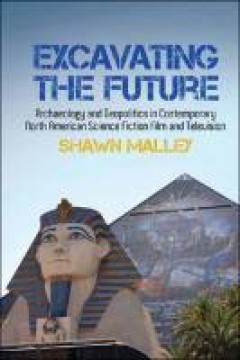
Excavating the future : archaeology and geopolitics in contemporary North Ame…
Well-known in science fiction for tomb-raiding and mummy-wrangling, the archaeologist has been a rich source for imagining ‘strange new worlds’ from ‘strange old worlds.’ But more than a well-spring for SF scenarios, the genre’s archaeological imaginary invites us to consider the ideological implications of digging up the past buried in the future. A cultural study of an array of very…
- Edition
- -
- ISBN/ISSN
- 9781786948731
- Collation
- XV, 228 p.
- Series Title
- -
- Call Number
- 791.43615097 MAL e
 Computer Science, Information & General Works
Computer Science, Information & General Works  Philosophy & Psychology
Philosophy & Psychology  Religion
Religion  Social Sciences
Social Sciences  Language
Language  Pure Science
Pure Science  Applied Sciences
Applied Sciences  Art & Recreation
Art & Recreation  Literature
Literature  History & Geography
History & Geography